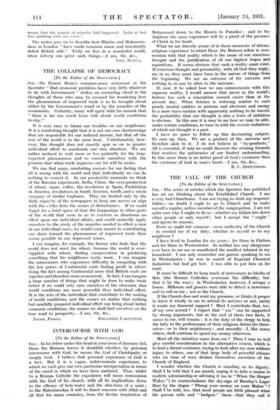THE COLLAPSE OF DEMOCRACY [To the Editor of the SPECTATOR.]
SIR,—Sir Ernest Benn's common-sense statement in the Spectator " that economic problems have very little whatever to do with Government " strikes an answering chord in the thoughts of those who may be excused for wondering how the phenomenon of improved trade is to be brought about either by the Government's wand or by the remedies of the economists.. Certainly, many will agree with his remark that " there is far too much loose talk about world conditions to-day."
It is very easy to blame our troubles on our neighbours. It is a comforting thought that it is not our own shortcomings that are responsible for our reduced income, but that all the rest of the world is in the same boat. Unfortunately, how- ever, this thought does not exactly spur us on to greater individual effort to ameliorate our own situation. We are rather inclined to wait more or less patiently for the long- expected phenomenon and to console ourselves with the promise that when trade improves our lot will be easier.
We can find many comforting excuses for our feeling that all is wrong with the world and that individually we can do nothing to correct it. In our pessimistic moments we think of the Russian experiment, India, China, the over-production of wheat, sugar, coffee, the revolution in Spain, Prohibition in America, revolutions in South America, tariffs, and a whole category of similar bugbears. They are limited only by the daily capac'ty of the newspapers to keep our nerves on edge With the cables from the scenes of disturbances. If we could forget for a brief space of time the happenings in other parts of the world that seem to us to exercise so disastrous an effect upon our individual affairs, and could earnestly apply Ourselves to the study of the remedies needed to effect a cure in our individual cases, we would come nearer to contributing our share toward the phenomenon of improved trade than stems possible to our depressed senses.
I can imagine, for example, the farmer who finds that the world does not want his wheat, because the world is over- supplied with wheat, finding compensation in producing something that his neighbours really want. I can imagine the mineowners who experience difficulty in competing with the low prices of Continental coals finding profit in adver- tising the fact among Continental users that British coals are superior and therefore more economical. In fact, I can imagine
large number of things that might be done to make trade better if we could only cure ourselves of the obsession that world conditions are more powerful than individual effort. It is the acts of the individual that contribute to the making of world conditions, and the sooner we realize that nothing but carefully prepared individual effort can bring about better economic conditions, the sooner we shall find ourselves on the true road to prosperity.—I am, Sir, &c.,






































 Previous page
Previous page